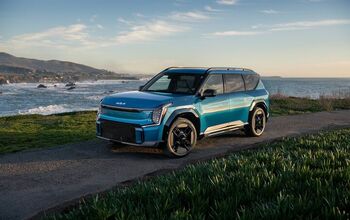Feeling Average? Study Shows Owning a Car Is Still the Cheapest Way to Get to Your Destination In a Car

Say you’re an urbanite who made the decision to leave the perils and unexpected expenses of car ownership begin and rely only on your phone. A money-saving choice? Not necessarily, according to a study the American Automobile Association.
Drawing information from numerous studies, AAA’s report looks at the cost of owning a vehicle versus the cost of replacing those same trips with a ride-hailing app and infrequent car rental. It’s not even close, but, as the saying goes, your mileage may vary.
The study focused only on urban dwellers, who, according to a previous study, drive an average of 10,841 miles annually. As we’re dealing with averages here, the vehicle in question is a medium-sized sedan. Amassing data from the AAA Foundation for Traffic Safety, the study found the average cost of ownership for this faceless sedan (including maintenance, fuel, insurance, vehicle payments) amounts to $7,321 a year, or $10,049 after factoring in parking charges.
If those same drivers replaced their total miles driven with ride-hailing apps and a few key rentals, the average annual cost comes to $20,118, or $1.86 per mile — far less than the $0.93 cost of owning a vehicle and paying for parking.
Just to bolster the ride-hailing side of the study, AAA found that the average car-less urbanite in possession of a driver’s license makes 2.1 road trips a year, totalling 11 days and 1,476 miles. Naturally, there’s a fair bit of variability in what it costs to travel by hailed car in these 20 cities. Total annual cost, including those rentals, amounted to $16,944 in Dallas, whereas Bostonians stand to spend $27,545.
On the car owner’s side, just as much variability exists. Some choose to own a large SUV or trucks; others, a Hyundai Accent or Mitsubishi Mirage. Fuel economy spans the gamut, as do miles driven, some vehicles are more reliable than others, and some drivers own their car outright. Average parking costs range from $706 in Phoenix to over eight grand in New York City.
While AAA’s study provides an interesting look at averages, what’s missing from the data is the option of not driving at all. Many urbanites have access to rapid transit within walking distance from their home or place of work, and this study admittedly doesn’t take that into account. Few people living with a subway or commuter train close at hand would take an Uber into work every single morning, as they’d probably get there late.
Transit and cycling, where it’s a viable option, easily supplements vehicle trips, lowering overall transportation costs for car owners and abstainers alike. As well, looking just at car owners, how many miles driven are necessary miles? We all take the long way home from time to time, or just go for a drive with no destination in mind. This eats up plenty of miles, but we do it because we can. No one hails a Lyft and tells the driver, “Never mind the route I asked for. Just take me for a ride.”
For car owners, buying groceries at the nearest store isn’t a necessity. We’ll drive past four grocery stores to get to the one we like better — the one with those amazing sales on ground beef. Again, more miles, but not necessary ones.
Everyone weighs their options and ends up making choices that works for their particular situation. But the study offers food for thought for members of the anti-car crowd who live too busy a life to stand on the side of the road, waiting for a bus.

More by Steph Willems
Latest Car Reviews
Read moreLatest Product Reviews
Read moreRecent Comments
- Bd2 Mark my words : Lexus Deathwatch Part 1, the T24 From Hell!
- Michael S6 Cadillac is beyond fixing because of lack of investment and uncompetitive products. The division and GM are essentially held afloat by mega size SUV (and pick up truck GM) that only domestic brainwashed population buys. Cadillac only hope was to leapfrog the competition in the luxury EV market but that turned out disastrously with the botches role out of the Lyriq which is now dead on arrival.
- BlackEldo I'm not sure the entire brand can be fixed, but maybe they should start with the C pillar on the CT5...
- Bd2 To sum up my comments and follow-up comments here backed by some data, perhaps Cadillac should look to the Genesis formula in order to secure a more competitive position in the market. Indeed, by using bespoke Rwd chassis, powertrains and interiors Genesis is selling neck and neck with Lexus while ATPs are 15 to 35% higher depending on the segment you are looking at. While Lexus can't sell Rwd sedans, Genesis is outpacing them 2.2 to 1. Genesis is an industry world changing success story, frankly Cadillac would be insane to not replicate it for themselves.
- Bd2 Even Lexus is feeling the burn of not being able to compete in the e-ATP arena.


































Comments
Join the conversation
Yes there are a few people that can get by cheaper without owning a car, but to assume more than a tiny fraction of people want to live that way is basically saying that the 98% of the population that own a car are totally irrational. The other factor is that once you own a car, it is normally far cheaper to use it than let it sit while paying for the mobility redundancy of an Uber or bus ticket. Furthermore, those that own an EV or hybrid are even less likely to take the bus or walk, because they are already saving the world.
I think it will depend on whether you live in New York City or Omaha, Nebraska.